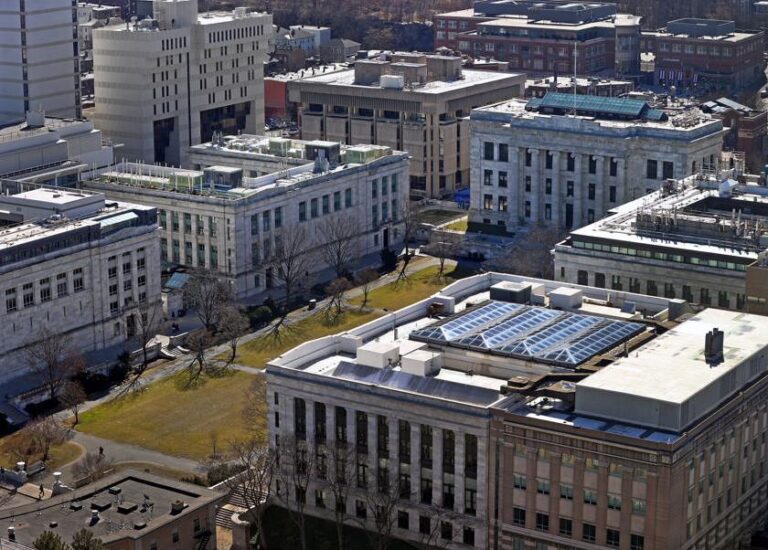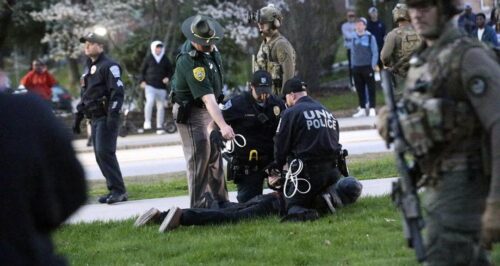Officials at Harvard Medical School nixed a lecture this week that would have featured patients from war-torn Gaza who are being treated in Boston, citing concerns that the event would be too divisive and present only one side of the Israel-Hamas conflict, according to an email obtained by the Globe.
“In the days since the session was first publicized last week, we heard from students and faculty members who expressed concerns about hearing from individuals impacted in Gaza without also hearing from individuals impacted in Israel,’’ wrote George Q. Daley and Bernard S. Chang, both of whom are deans at the school, in an email to first-year medical and dental students. “The conflict continues to inflame passions and provoke divisions in our community, and it is our aim to ensure that HMS provides a constructive, non-polarized educational environment for students of all backgrounds and beliefs.’’
The Harvard Crimson first reported the cancellation of the Jan. 21 event, which was to include a lecture by Dr. Barry Levy, followed by a moderated discussion with families of patients from Gaza who are receiving care locally. In the email, the two Harvard deans said they are committed to teaching the impact of war on the delivery of health care, but “to do so in a way that does not divide members of our community.’’
Some students were offended by the cancellation.
“The medical school cancelled this event, which was planned for weeks and supported by the course faculty, less than 12 hours before it would have taken place,’’ said Mary DeVellis, an M.D. candidate at the school, in an email to the Globe. “Students were outraged at this action and have expressed their concerns to the administration.’’
Messages left with Harvard Medical School were not immediately returned Friday.
Dr. David Shumway Jones, a professor at the medical school, said in an email to the Globe Friday, “Plans are underway to reschedule the events and I believe they will happen,’’ he said.
The scrapping of the lecture is the latest controversy for Harvard in what has been a week of turmoil for the Ivy League institution. A day after Donald Trump’s second presidential inauguration, Harvard University said it would begin using a definition of antisemitism that the first Trump administration promoted and that critics say can lead to censorship of pro-Palestinian speech.
Harvard’s announcement on Tuesday came as part of a settlement of two lawsuits filed by Jewish students and advocacy groups last year amid campus protests over the war in Gaza that followed the Oct. 7 Hamas attack on Israel. The protests engendered fierce debates, from Harvard Yard to Congress, over where to draw the line between criticism of Israel and speech that veers into antisemitism, and forced universities to grapple with how to strike the balance between protecting free expression and policing offensive or bigoted speech.
The definition, adopted by the International Holocaust Remembrance Alliance, as well as more than 40 nations — but only a handful of American universities — says that certain kinds of criticism of Israel and Zionism can be antisemitic, such as asserting that “the existence of a State of Israel is a racist endeavor’’ or “drawing comparisons of contemporary Israeli policy to that of the Nazis.’’
The so-called IHRA definition does not say, however, that all criticism of Israel is out of bounds. “Criticism of Israel similar to that leveled against any other country cannot be regarded as antisemitic,’’ the definition says.
Both sides saw Harvard’s announcement as a product of the politics of the moment.
The news-dense week at Harvard, and in the country overall, has left Fatema Ahmad, executive director of the Muslim Justice League, feeling pessimistic about what the year will hold for pro-Palestinian speech on campuses.
’’We’ve already seen Harvard and many other universities lean toward repressing Palestinian voices, voices that are speaking up for the lives and dignity of Palestinians — long before Trump and long before the past year of genocide that we have been witnessing, and that will be uncovered even more as folks return to their destroyed cities during the ceasefire,’’ she said. “We know it’s potentially going to get a lot worse.’’
In other news, Trump’s sweeping executive order calling for an end to diversity, equity, and inclusion policies singles out colleges and universities for enforcement, an opening bid to remake higher education institutions that Trump and his allies see as the original source of progressive values they deride.
The order, signed Tuesday, could have wide-ranging implications across higher education as it demands that recipients of federal contracts and grants swear off DEI programs, and threatens investigations of universities with endowments over $1 billion, which could include many New England institutions such as Harvard University, MIT, and Northeastern University.
The directive may accelerate a rollback of DEI policies already underway. Some corporations have recently abolished their DEI offices. MIT and Harvard’s largest academic division last year ended the practice of requiring professors to outline how they would further DEI goals when applying for jobs, although each school still has DEI administrators and programs.
And on Thursday, the university laid off the staff of its Harvard Slavery Remembrance Program and outsourced the project, which is part of a $100 million initiative to identify the direct descendants of those enslaved by the Ivy League school’s leadership, faculty, or staff.
American Ancestors, a Boston-based genealogical nonprofit and a current research partner, will take over the program.
Harvard spokesperson Sarah E. Kennedy O’Reilly declined to comment on the layoffs.
Danny McDonald can be reached at daniel.mcdonald@globe.com. Follow him @Danny__McDonald.
Spencer Buell can be reached at spencer.buell@globe.com. Follow him @SpencerBuell.

